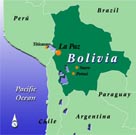Vote on constitution is new round in Bolivian power struggle
 Buenos Aires/La Paz - Bolivians will decide Sunday on a new constitution that Evo Morales - the first president of indigenous descent in the country's history - hopes will lay the groundwork for a socialist order.
Buenos Aires/La Paz - Bolivians will decide Sunday on a new constitution that Evo Morales - the first president of indigenous descent in the country's history - hopes will lay the groundwork for a socialist order.
Opinion polls show the referendum with a majority among respondents.
Even if that support holds at the ballot box, four of Bolivia's nine provinces are likely to continue fiercely opposing Morales' ethnically oriented socialist policies.
Already in Bolivia's last referendum in August, the four provinces of Santa Cruz, Beni, Pando and Tarija - all governed by the conservative opposition to left-wing populist Morales - paid little attention to the national result of the recall vote on the president's mandate.
Morales got close to 60 per cent of the vote, improving on his victory in the 2005 presidential election with 53.7 per cent of the vote. But he was sounded defeated in the four dissident provinces.
Bolivia has long been deeply divided.
The country's relatively wealthy upper class of European descent dominate the fertile and natural-gas-rich eastern lowlands, were the four opposition-led provinces are located.
Bolivia's indigenous majority lives mostly in poverty, predominantly in the barren western highlands. For centuries, the disadvantaged Indios who form Morales' political base have lived in the west, particularly in La Paz and El Alto.
Morales already provoked the anger of Bolivia's old elites early in his term with the nationalization of key industries, especially natural gas and oil. Land reform, with the confiscation of allegedly non-producing land for redistribution to the poor, continued the rift.
Morales has sought to deny the opposition-led provinces' demands for more autonomy, which has sometimes bordered on threats of outright secession.
Morales says his goal is Bolivia's transformation into what he calls "a state with equality, fairness and autonomy."
"We are in the middle of a transition from a neoliberal state to a multinational state, through the approval of the new constitution," he said. (dpa)